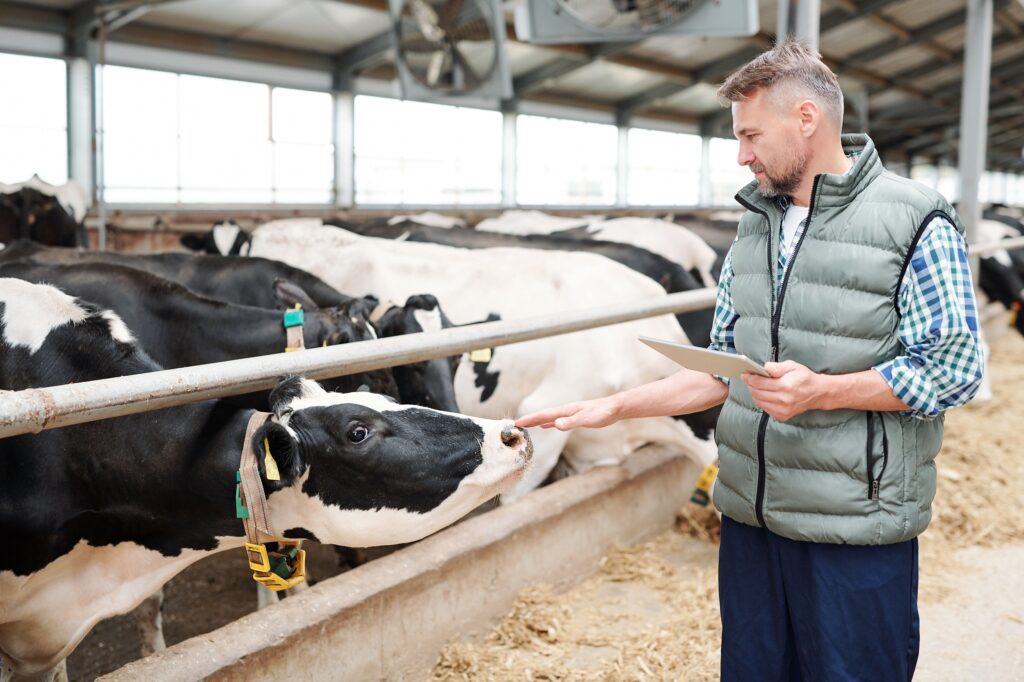

The other day a colleague and I were talking about how hard it is to keep all those metaphorical plates spinning. Home, work, family, hobbies; sometimes it just seems like you don’t have enough time in the day. And it occurred to me to relate a lesson I learned in my time as a dairy farmer: Just listen to your cows.
OK, OK I get it. You don’t have any cows, certainly not the kind that can tell you how to keep up on your responsibilities. And yes, one thing you may not know about me is I come from a family of farmers. Third generation dairy farmer, in fact, and proud of it.
Here’s the punchline: the lesson I learned on the farm to keep all those plates spinning was to actively manage my routine. Daily, weekly, yearly, doesn’t matter- when I have a good routine in place, I am at my best professionally, as a dad and husband, even with my side interests or hobbies. It all boils down to routines.
But what does a good routine have to do with dairy cows? Well, believe it or not, no one loves a good routine more than a barn full of cows. It’s true! They live for it. Cows know exactly when everything is supposed to happen. They know when the farmer is supposed to feed them, what time the barn gets cleaned, and when it’s time for milking. They know when they’re supposed to be let outside during the summer and how long they’ve got before it’s time to come back in. When they’ve spent the day in the pasture grazing, they’ll all come back and line up at the gate, just in time to start the milking and get their supper. It’s just a fact of farm life: Cows love routine. And as is often the case in these things, as much as cows love a good routine, they also hate the lack of one.
Here’s how I learned this lesson. In my younger days, like many of us, I was less responsible than I am now. Sometimes I’d be a little late getting out to the barn to start my chores. Maybe I’d sleep in for a few extra minutes. I’d tell myself it wasn’t that big of a deal, but I knew deep down that wasn’t true. In fact, to the cows, it was quite a big deal indeed. You see, it’s the farmer’s job to set the routine for the cows and then stick to it. Frankly I was not holding up my end of the bargain. And they’d let me know. It would start with one cow starting to complain. Very loudly. Then another one would join in. Then, another. Then before you knew it the whole barn had joined in. When your cows begin to feel like you’re not meeting their expectations, they start to moo at the top of their lungs. A whole barnful of cows complaining about you being late is a loud and unforgettable misery of broken expectations. Sometimes you could even hear the cows complaining at the next farm down the road if their farmer had gotten sufficiently delayed. “Sounds like old Abernathy’s late getting out to the barn again, hope his arthritis isn’t acting up”. You know when your cows are not happy, and they’re not happy when you don’t follow the routine.
All in, cows complain when they get stressed, because they’re uncomfortable, hungry, or just out of their routine. The more stressed they get, the less milk they produce and the more susceptible they are to get sick or hurt. I never wanted that to happen, because a dairy farmer is in the business of selling milk, and a good dairy farmer is in the business of taking good care of his or her cows. So, I learned my lesson. I grew up a little bit and buckled down. I got up on time, got going earlier, planned my days better. I gave the cows a good routine to expect, but I also gave myself one too. When I got better at my routine, I noticed that things seemed to go easier. Morning and evening chores got easier and went faster. The cows cranked up their production so we were able to sell more milk, and it had a higher milkfat percentage (that’s good). The farm was starting to get more profitable, and the days seemed to go easier. We were even able to get more time on the tractor to open up more viable acres, manage the crops better, and work on some of the “want-to” projects, not just the “need-to” ones. We got a couple good cuttings off our fields and filled the barn with hay for the winter. We were able to put up a good corn crop and pay off more of the farm’s operating debt. When we had an emergency here or there, it didn’t ruin our entire day because we were able to get right back into the routine after we had handled it.
You know what? When I got my routine right, and everything was running smoothly, it suddenly got a lot quieter around the farm. Our cows had stopped complaining, and all it took was for me to listen to them. They were quiet because they were happily plugging along in their routine.
These days, just like on the farm, I find that when my routine is good, I’m better at all of my responsibilities. My work product is better, and I have time to add in the discretionary touches that move our agenda forward. I have time to eat properly, work out, and manage my health. My hobbies and side interests get the cultivation they need. My family feels like I’m investing in them, and we all benefit from each other’s attention. All the plates my colleague and I were talking about earlier spin well, and even if one wobbles a little bit I can catch it and spin it back up before it topples over. The lesson I learned, which I bring with me to this day, is that a good routine can make all of your responsibilities easier to manage. All of us can benefit from knowing what to expect each day, week, month, or year and having a plan when we walk in. Most of us don’t have the responsibility of taking care of a barn full of cows, so there’s no mooing when we get out of our routine, more’s the pity. But the principle still makes a lot of sense no matter what you’re doing: Manage your routine actively.
And listen to your cows.
HR leader Patrick Ingham proudly comes from an operating diary farm in Northern New York, where honey, apples, and maple syrup are also organically produced.
